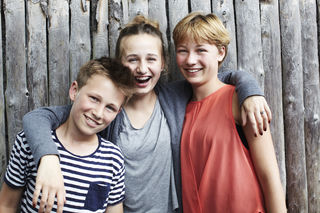Family Dynamics
Does Your Birth Order Actually Matter?
New research tries to separate the myths from the facts.
Posted November 17, 2015 Reviewed by Ekua Hagan
Key points
- One study reported firstborn children have a higher IQ of 1.5 points; another study cited the IQ difference as "almost imperceptible."
- New studies find that personality is not determined by one's birth order.
- The differences parents see in their children as relates to a child’s position in the family may be more an effect of age than anything else.

Forget the labels you assign to yourself or your children based on your or their position in a sibling hierarchy. Personality traits we have long applied to firstborn, middle, or youngest children have been challenged and the previous evidence found questionable, if not just incorrect.
In 1928, Alfred Adler looked at children’s position in the family and claimed that birth order had a significant effect on personality. Decades later, proponent Frank Sulloway advanced that position in his notable book, Born to Rebel: Birth Order, Family Dynamics, and Creative Lives. Sulloway argued that firstborns are more assertive, ambitious, and conforming, while later-born siblings are more adventurous and rebellious, to cite just a few examples.
Psychological theory and cultural archetypes about birth order remain embedded in current thinking. Who hasn’t heard comments like, “I can always count on my oldest, he’s so dependable," or, about one's youngest, “She’s so outgoing and social.”
Views like Sulloway’s have been accepted as fact and held fast—until now.
Birth Order Thinking Debunked
Contrary to popular belief, birth order is not an important factor in personality development, although it is frequently cited to explain that development, as well as differences in intelligence within families.
New studies, however, find that personality is not determined by one's birth order. Two large studies scrutinized what is known as “The Big Five” personality traits—extraversion, emotional stability, agreeableness, conscientiousness, and openness to experience—to determine the effect of birth order on personality development.
In one study, Julia Rohrer of the University of Leipzig, and her colleagues Boris Egloff and Stefan Schmukle, scrutinized data from 20,000 adults in the United States, Germany, and England. In addition to comparing siblings in the same family (within-family design), they also looked at differences between families (between-family design). (These study models, when used independently of each other, result in findings that are often questioned by researchers.)
Rohrer determined that over a life’s course, “birth order does not have a lasting effect on broad personality traits outside of the intellectual domain.” She found "no birth-order effects on extraversion, emotional stability, agreeableness, conscientiousness, or imagination. This finding contradicts lay beliefs," she wrote, as well as prominent scientific theories, and indicates that the development of personality is less determined by one's role within the family of origin than previously thought.
According to the study, the differences parents see in their children as relates to a child’s position in the family may be more an effect of age than anything else. A younger sibling may become more conscientious with time, or as conscientious and reliable as an older brother or sister who is the firstborn. In other words, we might be calling a behavior a birth order trait when we should be wondering if it’s an age effect.
The second study drew similar conclusions. Researchers Rodica Damian and Brent Roberts of the University of Houston and the University of Illinois, respectively, note that after looking at data for 337,000 students, “We found very small associations between birth order and personality."
In a commentary for The Proceedings of the National Academy of Sciences entitled, “Settling the debate on birth order and personality,” they wrote:
“Scientific evidence strongly suggests that birth order has little or no substantive relation to personality trait development and a minuscule relation to the development of intelligence.”
Are Firstborns Really Smarter?
Both studies looked at the claim that firstborns are more intelligent and did find a small edge for the oldest child. Rohrer’s study reports a 1.5-point difference in IQ; Damian and Roberts found “an almost imperceptible 1 point on an IQ test in the largest case," and added:
“Although, again, the effect sizes were quite small, we did find larger partial correlations for verbal ability (as opposed to math or spatial ability), which is in line with the predictions of the model, whereby the parental attention advantage that firstborns have mostly consists of verbal stimulation.”
Birth Order Labeling Is Stereotyping
The birth order debate has gone on in the scientific community for decades. We now realize that often the weight we put on birth order is simply a convenient way to explain our children’s (or our own) behavior: “What do you expect? I was the youngest child.” “Of course, Kelly will have everything ready. She’s my responsible firstborn.”
However, labeling children feels unproductive for their development, besides probably being inaccurate. In reality, birth order is just one more type of stereotyping. We know that people cling to longstanding notions whether or not they are valid: The stereotypes assigned to only children have lingered in spite of reams of evidence disproving them.
Copyright @2015, 2019 by Susan Newman
References
Adler, A. (1928) Characteristics of the first, second and third child. Children 3:14–52.
Damian, R.I., Roberts, B.W. “The Associations of Birth Order with Personality and Intelligence in a Representative Sample of U.S. High School Students.” Journal of Research in Personality: Volume 58, October 2015, Pages 96–105.
doi: http://dx.doi.org/10.1016/j.jrp.2015.05.005
Damian, R.I. and Roberts, B.W. “Settling the debate on birth order and personality.” The Proceedings of the National Academy of Sciences. October, 2015. doi:10.1073/pnas.151906411
Rohrer, Julia, Boris Egloff and Stefan C Schmukle, “Examining the effects of birth order on personality.” October, 2015.
Sulloway FJ (2007) Birth order and intelligence. Science 316:1711–1712.
Sulloway, Frank J. Born to Rebel: Birth Order, Family Dynamics, and Creative Lives. New York: Pantheon,1996 First edition. http://amzn.to/1MpUPiu




